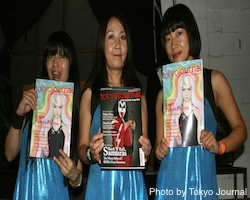Shonen Knife
Pop Punk Trio Rock With 1,000+ Shows and 20 Albums Over 30 Years
The late Nirvana singer/guitarist Kurt Cobain was one of their biggest fans, saying, “When I finally got to see them live, I was transformed into a hysterical nine-year-old girl at a Beatles concert.” Formed in 1981, the Osaka-based all-female band Shonen Knife influenced ‘90s alternative acts like Sonic Youth and Redd Kross with driving beats, catchy melodies and simplistic lyrics about food and animals like “Banana Chips,” “I Am A Cat,” “Ramen Rock” and “Cannibal Papaya.” Tokyo Journal Executive Editor Anthony Al-Jamie carried out a backstage interview with singer/guitarist/founder Naoko Yamano, bassist Ritsuko Taneda and drummer Emi Morimoto prior to their October 2014 gig at the Bootleg Theater in Los Angeles
TJ: Why do you think Shonen Knife has been so successful over the past three decades?
YAMANO: I think it’s because I write western- style rock music. Also, my lyrics are very unique. I sing about animals and sweets. My melody line is very simple pop and easy to memorize, so I think that’s why we’re popular.
TJ:Who influenced you musically?
YAMANO: I listen to all kinds of music from rock to hip-hop and soul, even Japanese folk music and classical music. I was inspired by the Beatles, the Ramones, the Buzzcocks and late seventies punk pop. The new album Overdrive is a mix of seventies British and American hard rock like Judas Priest, Black Sabbath and Thin Lizzy.
TANEDA: I like The Primitives and Shonen Knife.
MORIMOTO: I’m a drummer, so I like Keith Moon.
TJ: You just performed your 1,000th show last month. Do you still get nervous before you go on stage? What’s the hardest part of being on tour?
YAMANO: For this tour, we are playing every night so I got used to it, but if there is more than a three-month interval between gigs, we get nervous about going back out there. We have 34 shows in six weeks all around Canada and the U.S. We drive more than six hours every day. Then we’ll go back to Japan on October 24 for some shows, India for a music festival in November and then tour Australia and New Zealand next January and February. Traveling is the hardest part. The long drive is very hard.
TANEDA: Food! I miss Japanese food a lot. I miss ramen noodles every day!
MORIMOTO: I want to exercise more, but I’m in a van driving all the time.
 TJ: Do you prefer singing in English or in Japanese?
TJ: Do you prefer singing in English or in Japanese?
YAMANO: I prefer English because I’m inspired by western music and the language of rock and roll is English.
TJ: Is there a difference in the music business between Japan and the U.S.?
YAMANO: Yeah, it’s a little different. In Japan, everything is together. The promoter is also booking gigs and managing the band. But here the booking agent, promoter and publicity person are separate.
TJ: How did you get to open for Nirvana?
YAMANO: I think Kurt Cobain was a big fan of Shonen Knife. When we came to Los Angeles in the early nineties, Kurt Cobain came to see our show and then Kurt’s manager contacted our manager. It was a wonderful experience. Before the tour started I didn’t know Nirvana. I saw their photograph and they looked very wild, so I was a little scared and I didn’t want to go on tour with them, but once I met them, they were very kind and gentle. In November 1991, we had a three-week tour all over Britain and then in 1993 we had seven shows in the U.S.
TJ: I understand you did one of the first live music broadcasts over the Internet. Can you tell us about your performance you did for Microsoft?
YAMANO: I think it was in the late nineties. Microsoft used our Carpenters cover song of “Top of the World” for a TV commercial and we played at Microsoft’s headquarters in Seattle. It was broadcast live on the Internet like Ustream. It was one of the first such broadcasts.
TJ: Do you have a goal?
YAMANO: I want to make many people happy through our music. That’s my goal! tj
The original article can be found in Issue #276 of the Tokyo Journal. Click here to order from Amazon.




























